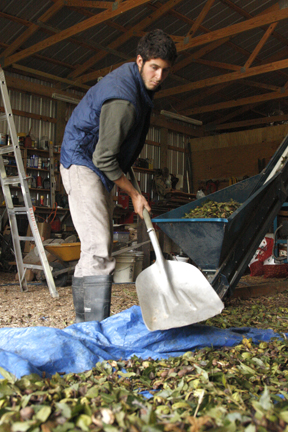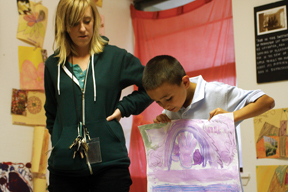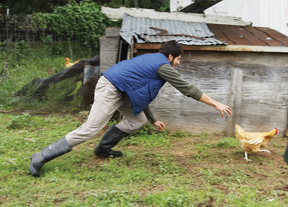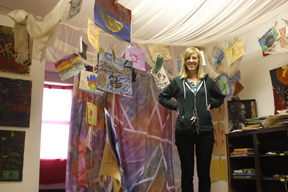Story By Chad Shanks
Photos By Shanna Taylor
Six friends sit together outside of Common Grounds on a damp and drizzly evening.
The table’s overhead umbrella keeps them dry as they discuss theology and the true meaning of Christian community, conversation foreign to most university coffee shops, but typical at Baylor.
A woman emerges from the darkness to briefly interrupt them, her black hair matted to her head, her deep wrinkles evidence she has seen better days. Her plea begins like most,with a tearful tale of misfortune followed by a passionate request for the funds to get her wherever she
happened to be going.
The six friends, mostly 2009 Baylor graduates, appear to be stereotypical college students with their parents’ money to burn and a strong sense of sympathy.
She moves on without receiving any money, only the names of multiple Waco organizations that could provide her assistance.
Would she have saved her breath if she had known the six she solicited were intentionally living well below the poverty line?
***
In 2008, The American City Business Journal ranked Waco the 10th poorest city in America, and its violent crime rates are consistently well above state and national averages.
As a result, many Baylor students’ four-year stay includes anticipation for the day they finally get out of Waco.
However, a growing number of graduates are choosing to remain in their college home and join the community, even forsaking the comforts of their familiar Baylor neighborhoods and venturing across Interstate 35 into parts of North Waco that have helped form the city’s bad reputation.
After meeting and bonding at Baylor, the six friends at Common Grounds agreed to dedicate their post-college lives to changing that reputation.
As their contemporaries mount the bottom rungs of various corporate ladders, they each set up residence locally, choosing jobs that neglect the higher salaries their new degrees could have provided in favor of positions that impact the lives of their new neighbors.
***
John Thornton remained in Waco for Gederion Wilkerson, an 11-year-old only child living in Parkside Village Apartments, a North Waco complex frequently blamed for the area’s high crime rate.
The unlikely friendship developed after Thornton began mentoring Parkside kids during his senior year. Today, the pair can be spotted together all over town, from Baylor basketball games to Chick-fil-A.
Thornton’s friendship with Gederion led to relationships with several other Parkside kids, making it a common sight to see him and a large group of children having lunch together after church.
However, these outings can be expensive, and Thornton usually picks up the check, even though his earnings as a tutor do not necessarily cover food for other people’s children.
Regardless, to Thornton, the relationships formed take precedence over the numbers on his monthly bank statement.
“This isn’t something I just did for fun senior year; I’m still here,” Thornton said. “These are people I’m committing my life to. I can’t imagine life without Gederion and his friends and can’t picture going out to eat without a group
of kids with us.”
Still, the pressures of building relationships in such a volatile area can take a toll.
Recently, a drive-by shooting in Parkside left a resident dead, and Thornton had the task of explaining the situation to the children.
“There are better paying jobs and jobs that are less stressful, jobs where I don’t have to deal with people getting shot; but life in the suburbs doesn’t necessarily have everything,” Thornton said.
***
Griffin Kelp joined Thornton in moving to North Waco, gaining employment through Americorps building homes for Habitat for Humanity.
He rides his bike through the neighborhood and is frequently greeted along the road with, “You’re in the wrong neighborhood, white boy.”
The warnings do not detract Kelp from his sense of calling to the area, however.
“It’s definitely not Baylor, but I love it,” he said.
The group is not ignorant of the racial tensions involved with a group of young white people going into a traditionally black neighborhood and trying to improve conditions.
Ray Small and Ben Carroll, who live and work at the World Hunger Farm, a nonprofit that teaches inner city youth sustainable farming techniques, understand the fine line they must walk.
“Growing up in Chicago, I could avoid the parts of town that forced me to face reality, but not in Waco,” Small said. “It’s not our position to go into these neighborhoods and say, ‘You should be a white person,’ and completely neglect aspects of their culture.”
While tensions exist and some are not fond of the group’s presence in the neighborhood, most are supportive, and their newfound relationships form the foundation of their work.
“They treat us better when we go into their neighborhood than we usually treat them when they come into ours,” Carroll said.
Still, not everyone understands college graduates rejecting the basic premise for getting an education.
Kelp spent last summer working with his father as a financial analyst in Cincinnati, but turned down a permanent position to return to Waco and take a job that makes him eligible for food stamps.
Naturally, his parents, like most of the group’s parents, are not exactly thrilled with their child choosing to live in poverty, Small said.
“My parents wish I had made different decisions. They’re not completely opposed to the idea, but they still bring up grad school every time I talk to them in hopes that I’m going to get this all out of my system,” Small said.
Julie Leary turned down a teaching job at La Vega ISD to work for less money with traumatized children, a decision her mother is attempting to get behind.
“My mom is surprisingly supportive. She’s not happy about me turning down a job but is supportive of what I’m doing,” she said.
Baylor graduate and current McLennan Community College and Waco Centers for Disease Control employee Gabriela Gatlin grew up on North 15th Street.
As a child, seeing prostitutes and people strung out on drugs walking up and down her street was commonplace. Gunshots were so frequent she would hit the ground upon hearing a car backfire.
She has seen the influx of outsiders to her neighborhood and recognizes the good work done, but questions whether the results are due to true healing or simply the problems moving to other parts of town.
“People struggle all over the world, not just here. The reputation of this neighborhood says more about the fears and prejudices in the area rather than the neighborhood itself,” Gatlin said.
Gatlin, who still lives in the area and dedicates her life to improving it, believes it needs more societal structural change, such as increased educational opportunities and the chance to earn a living wage, rather than middle class people simply moving in and saying, “God loves you. Now be like us.”
She remembers a church group moving into her neighborhood and proclaiming a well-known local resident was demon possessed and putting hexes on neighbors’ homes, when, in fact, his odd behavior resulted from having damaged his brain on drugs years earlier.
“I appreciate all the work the various groups and organizations have done, but sometimes a passion for ministry can lead to an over-blowing of the situation,” she said. “People need to first look and listen and learn the history of the area before just jumping in and trying to fix everybody.”
While the six new Wacoans credit their Christian faith with motivating their choices, they do not consider themselves urban missionaries.
“What we do here is absolutely tied to our faith in Christ, but when people come in here with Bibles blazing saying, ‘We’ve got a week to convert everybody,’ it’s a very incomplete view of the gospel,” Kelp said.
Grace Ladd started the Waco Arts Initiative to give children hope through art but says it is a mistake to believe her presence is necessary for their well-being.
“We don’t have the mindset that these poor underprivileged people need our help. They’re actually really interesting people,” she said.
The kids John Thornton mentors do not see him as a pastor or a minister, but as a friend who wants what is best for them.
“Normal for them growing up was not normal for me,” Thornton said. “For them, being a drug dealer is a viable option. I hope I can help show them there are other options.”
Everyone in the group emphasizes that they actively chose Waco as their home and plan on staying.
“I don’t want to leave. I don’t care if I only make a little; I love living here. I love my neighborhood and talking to the people and actually caring about them,” Small said.
However, their tenure as non-student Waco residents is in its infancy and has yet to stand the test of time.
Will they give into the temptation of better jobs in other cities after years of scraping by on meager wages? How will they support their eventual families and will they want to enroll their own children in a school district that ranks near the bottom in the state?
Some have labeled them young, wide-eyed idealists and predict they will follow the rest of their classmates out of town sooner or later, a possibility they recognize but refuse to let hinder their current work.
“Sure, we may be young and idealistic, but at least we’re giving it a shot,” Thornton said.
***
As their conversation at Common Grounds continues, a second panhandler emerges from the night.
His bushy beard, tinged slightly yellow from a buildup of filth, hides his deep-set eyes.
He avoids a sob story and simply asks for money.
As before, the group provides none. If they gave money, they would then be needing money, transforming themselves into the very impoverished they stayed to help – a circle of irony best avoided.
Again, they recommend a plethora of options for the man to seek help, options of which their new lifestyles have given them first-hand knowledge.
The man doesn’t respond, simply turns and moves to the next table.
As their conversation continues, he goes from table to table until there are none left, then continues down the street, disappearing back into the darkness.




